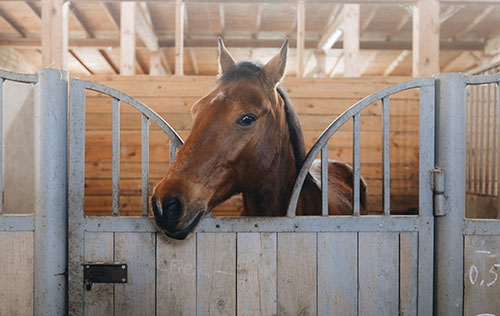Equine Heat Stress and Heat Stroke
Aug 22, 2022

Over the past couple of months, we have experienced higher than usual temperatures across the U.S., especially in the Southeast. With this unprecedented heat, dangers occur without proper management of your equine companions. See the below management techniques and warning signs to aid in the prevention of heat stress and heat stroke.
Horses require adequate amounts of water for everyday functions, and even more so in hot weather, so be sure to always have water available in your pasture and stalls. Access to shade will also protect horses from the sun’s harmful rays, and you may consider changing turnout times to cooler parts of the day, such as early morning, late night, or overnight. Avoid riding your horse when the combined air temperature (F) and relative humidity is over 150, especially if the horse is not acclimated to the heat.
Signs of heat stress:
Make sure to track feed intake, body condition, and body weight during hot weather, especially for older horses and those with other health issues. Contact your nutritionist or veterinarian if you notice any changes.
Signs of heat stroke:
For more content like this, check out the latest issue of The Cooperator.
Horses require adequate amounts of water for everyday functions, and even more so in hot weather, so be sure to always have water available in your pasture and stalls. Access to shade will also protect horses from the sun’s harmful rays, and you may consider changing turnout times to cooler parts of the day, such as early morning, late night, or overnight. Avoid riding your horse when the combined air temperature (F) and relative humidity is over 150, especially if the horse is not acclimated to the heat.
Signs of heat stress:
- Rectal temperature is above 103° F
- Increased heart rate
- Increased breathing rate
- Profuse sweating
- Droopy ears
- Tiredness
- Dehydration
- Skin tent lasting several seconds after pinching the skin of the neck or shoulders
- Reduced feed intake
Make sure to track feed intake, body condition, and body weight during hot weather, especially for older horses and those with other health issues. Contact your nutritionist or veterinarian if you notice any changes.
Signs of heat stroke:
- Rectal temperature is above 106° F
- Rapid heart and breath rates that don’t decline within 20 minutes of stopped exercise
- Whinnying and distress
- Dehydration with dry mucous membranes ad prolonged skin tents of 4 to 10 seconds
- Muscle weakness
- Incoordination
- Collapse
For more content like this, check out the latest issue of The Cooperator.